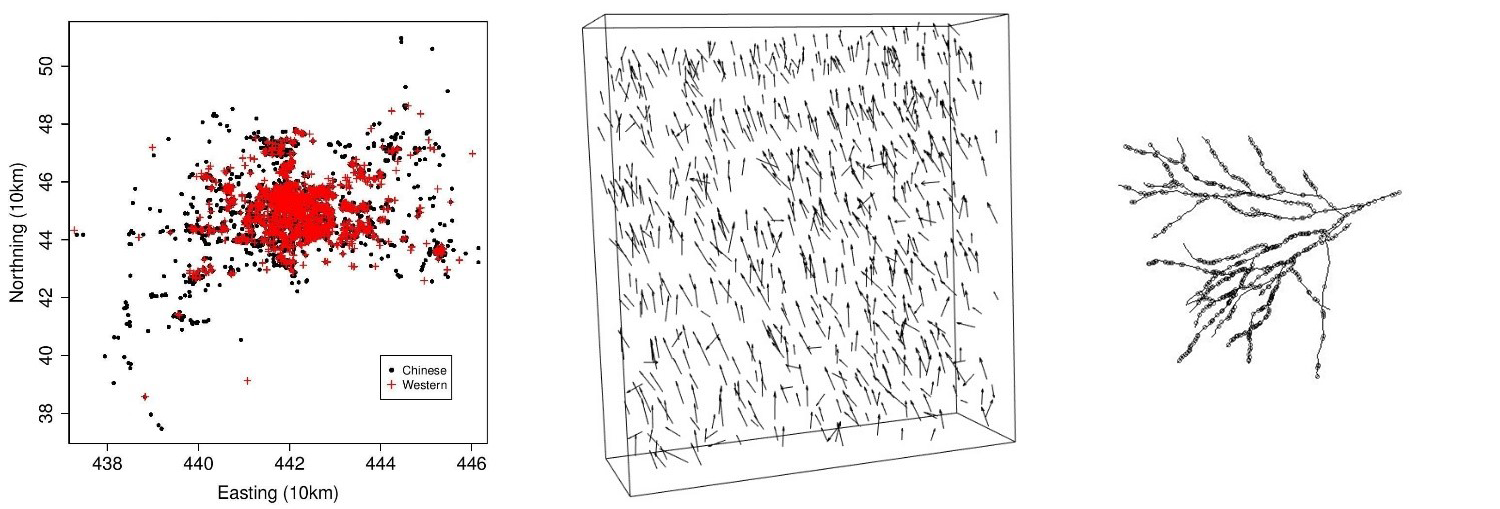A spatial point process is a mathematical model for randomly distributed points in two or higher dimensional space, e.g. the locations of restaurants in a city, trees in a forest, cases of a disease in a country or galaxies in the Universe. The model may be extended to include information about covariates such as soil conditions in case of trees and random `marks´ such as `types of points´ (e.g. different types of restaurants or species of trees), `size of associated object´ (e.g. the diameter of a tree at breast height) or `direction of associated object´ (e.g. the direction from the center of a brain cell to its apex). Fig. 1 shows three. While the mathematical theory for point processes on two or higher dimensional Euclidean space is fairly well-developed with accompanying user-friendly software for statistical analysis, notably the R package spatstat, the research on point processes defined on more general spaces such as linear networks and the sphere is in its infancy. The theory for marked point processes is also less developed. The extension to space-time point processes gives rise to further basic research problems.

Fig. 1: (a) locations of Western-style and Chinese restaurants in Beijing. (b) pyramidal brain cells’ nucleolus locations and their directions. (c) spine locations on a dendrite network of neurons.
The summer school provides an state-of-the-art introduction to statistics for point patterns in first Euclidean space and second on the sphere and linear networks. Along with this relevant software using the spatstat package will be introduced. Furthermore, two separate topics will be treated: statistics for space-time processes and topological tools for analyzing point patterns.
The lectures will be given by five members of the spatial point process group at Department of Mathematical Sciences, Aalborg University, which is recognized as an international leading group at the forefront of development of spatial point process theory and its applications. Professors Jesper Møller (JM) and Rasmus Waagepetersen (RW) have contributed with a number of influential papers and a research monograph which is a key reference. Associate Professor Jakob G. Rasmussen (JGR) is a specialist on spatial and temporal point processes, Associate Professor Ege Rubak (ER) has a strong background in computational methods for spatial point processes and is a co-author of a recent monograph about spatstat, and Associate Professor Christophe A.N. Biscio (CB) works with topological data analysis methods for spatial point processes.
Prerequisites: Basic knowledge in probability theory and mathematical statistics. Some knowledge about spatial statistics/point processes will be an advantage but is not requested.
Programme
Monday
8.30-11.45 Introduction to statistical analysis of point patterns in Euclidean space (RW+ER)
11.45-12.45 Lunch (see below)
12.45-15.30 More on statistical analysis of point patterns in Euclidean space (RW+ER)
19-21 Reception (see below)
Tuesday
8.30-11.45 More on statistical analysis of point patterns in Euclidean space (RW+ER)
11.45-12.45 Lunch (see below)
12.45-15.30 More on statistical analysis of point patterns in Euclidean space (RW+ER)
19-21 City walk (see below)
Wednesday
8.30-11.45 Statistical analysis of space-time point patterns (JGR)
11.45-12.45 Lunch (see below)
12.45-? Excursion (see below)
Thursday
8.30-10 More on statistical analysis of space-time point patterns (JGR)
10-10.15 Pause
10.15-11.45 Statistical analysis of point patterns on the sphere and linear networks (JM)
11.45-12.45 Lunch (see below)
12.45-14 More on statistical analysis of point patterns on the sphere and linear networks (JM)
14-14.15 Pause
14.15-15.30 Statistical analysis of point patterns on directed linear networks (JGR)
Friday
8.30-11.45 Topological and statistical analysis of point patterns (CB)
11.45-12.45 Lunch to go
Slides and other material: see https://spatstat.org/Aalborg2022/
Evaluation: The participants will be evaluated by successful participation during the lectures, including the solution of exercises.
Organizer: Professor Jesper Møller
ECTS: 4.0
Time: August 22 - 26, 2022
Place: Aalborg University, Fredrik Bajers Vej 7A room 4/108, DK-9200 Aalborg Ø.
Zip code: 9220
City: Aalborg
Number of seats: 25
Deadline: August 1, 2022
Payment: Registration fee for Danish PhD students = DKK 0
Registration fee for non-Danish PhD students is EUR 800. Registration fee for other participants is EUR 1067.
Reception, city walk and excursion are also free of charge.
All participants must pay for catering - see the link to payment below:
Please remember to sign up below and also pay for the catering at the link above.
- Teacher: Christophe Biscio
- Teacher: Jesper Møller
- Teacher: Jakob Gulddahl Rasmussen
- Teacher: Ege Rubak
- Teacher: Rasmus Waagepetersen